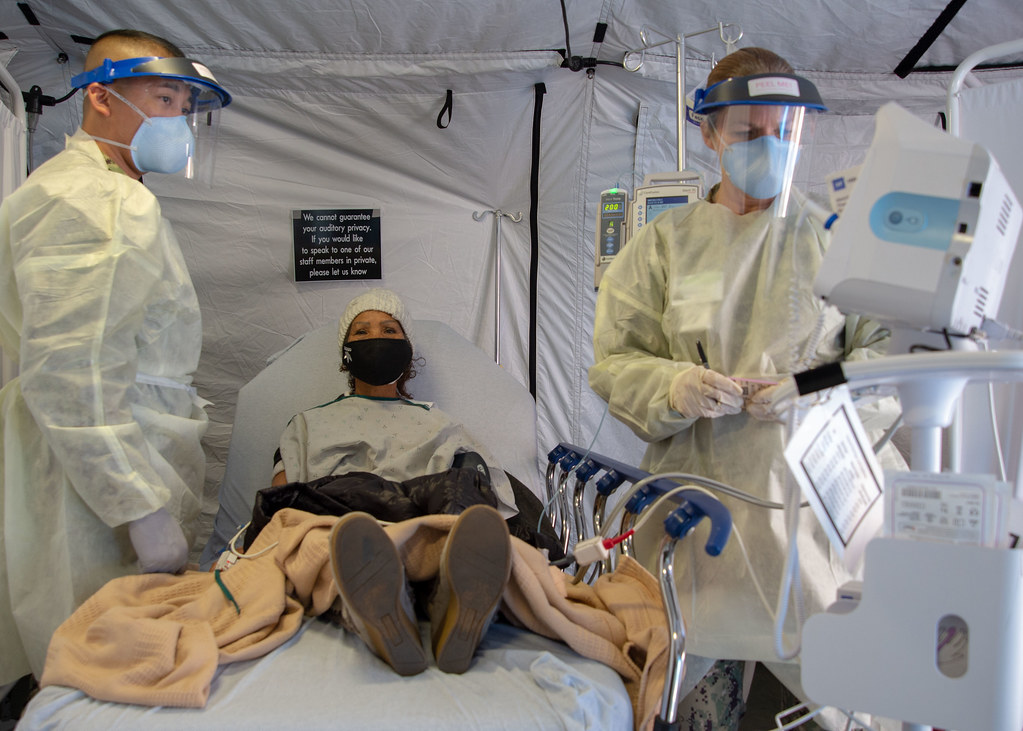News release
From:
WHO recommends antibody treatment for covid patients at high risk of hospital admission
And for severely ill patients who have no natural antibodies to covid-19
A treatment combining two antibodies (casirivimab and imdevimab) is recommended for two specific groups of patients with covid-19 by a WHO Guideline Development Group (GDG) panel of international experts and patients in The BMJ today.
The first are patients with non-severe covid-19 who are at highest risk of hospitalisation and the second are those with severe or critical covid-19 who are seronegative, meaning they have not mounted their own antibody response to covid-19.
The first recommendation is based on new evidence from three trials that have not yet been peer reviewed, but show that casirivimab and imdevimab probably reduce the risk of hospitalisation and duration of symptoms in those at highest risk of severe disease, such as unvaccinated, older, or immunosuppressed patients.
This second recommendation is based on data from the RECOVERY trial showing that casirivimab and imdevimab probably reduce deaths (ranging from 49 fewer per 1,000 in the severely ill to 87 fewer in the critically ill) and the need for mechanical ventilation in seronegative patients.
For all other covid-19 patients, any benefits of this antibody treatment are unlikely to be meaningful.
Casirivimab and imdevimab are monoclonal antibodies that when used together bind to the SARS-CoV-2 spike protein, neutralising the virus’s ability to infect cells.
The recommendations are part of a living guideline, developed by the World Health Organization with the methodological support of MAGIC Evidence Ecosystem Foundation, to provide up to date, trustworthy guidance on the management of covid-19 and help doctors make better decisions with their patients.
Living guidelines are useful in fast moving research areas like covid-19 because they allow researchers to update previously vetted and peer reviewed evidence summaries as new information becomes available.
The panel acknowledged several cost and resource implications associated with this treatment, which may make access to low and middle income countries challenging. For example, rapid serological tests will be needed to identify eligible patients who are severely ill, treatment must be given intravenously using specialist equipment, and patients should be monitored for allergic reactions.
They also recognise the possibility that new variants may emerge in which casirivimab and imdevimab antibodies may have reduced effect.
However, they say given the demonstrated benefits for patients, “the recommendations should provide a stimulus to engage all possible mechanisms to improve global access to the intervention and associated testing.”
Today’s guidance adds to previous recommendations for the use of interleukin-6 receptor blockers and systemic corticosteroids for patients with severe or critical covid-19; and against the use of ivermectin and hydroxychloroquine in patients with covid-19 regardless of disease severity.
[Ends]
Expert Reaction
These comments have been collated by the Science Media Centre to provide a variety of expert perspectives on this issue. Feel free to use these quotes in your stories. Views expressed are the personal opinions of the experts named. They do not represent the views of the SMC or any other organisation unless specifically stated.
The newest edition of the WHO Covid-19 guidelines recommends the use of neutralising monoclonal antibodies like casirivimab and imdevimab for patients with Covid-19 who are at a high risk of requiring hospitalisation. This would typically be older people with age > 65, and people with co-morbidities like diabetes and many other serious chronic conditions. To be most effective these antibodies must be given early in the course of Covid-19.
“The WHO recommendations focus specifically on casirivimab and imdevimab but it is likely that other monoclonal antibodies directed at SARS-CoV2, which are produced by a number of pharmaceutical companies, will prove to be similarly effective. More research will need to be done to prove this. The Regeneron Pharmaceuticals product (casirivimab and imdevimab) has the advantage of strong evidence of effectiveness at preventing symptomatic infection following exposure to SARS-CoV2. In addition this preventive therapy works following subcutaneous administration which is advantageous over intravenous administration routes.
"Anti-SARS-CoV2 antibodies have the potential to greatly decrease infection post SARS-CoV-2 exposure and to lessen symptoms following any infections that do occur, but they must be given early in the course, preferably within 96 hours of the index case having a positive test.
“This treatment (known as Ronapreve in NZ) is not currently approved in New Zealand. However, an application was lodged with Medsafe on 3 Sept by Roche Products, which is handling the Regeneron product in NZ. It is undergoing priority review.



 International
International



